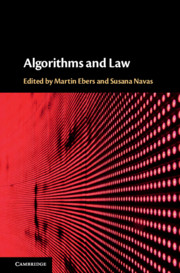Book contents
- Algorithms and Law
- Algorithms and Law
- Copyright page
- Contents
- List of Figures and Tables
- Notes on Contributors
- Preface
- Acknowledgments
- 1 Robotics and Artificial Intelligence
- 2 Regulating AI and Robotics
- 3 Regulating Algorithms
- 4 Automated Decision-Making under Article 22 GDPR
- 5 Robot Machines and Civil Liability
- 6 Extra-Contractual Liability for Wrongs Committed by Autonomous Systems
- 7 Control of Algorithms in Financial Markets
- 8 Creativity of Algorithms and Copyright Law
- 9 “Wake Neutrality” of Artificial Intelligence Devices
- 10 The (Envisaged) Legal Framework for Commercialisation of Digital Data within the EU
6 - Extra-Contractual Liability for Wrongs Committed by Autonomous Systems
Published online by Cambridge University Press: 04 July 2020
- Algorithms and Law
- Algorithms and Law
- Copyright page
- Contents
- List of Figures and Tables
- Notes on Contributors
- Preface
- Acknowledgments
- 1 Robotics and Artificial Intelligence
- 2 Regulating AI and Robotics
- 3 Regulating Algorithms
- 4 Automated Decision-Making under Article 22 GDPR
- 5 Robot Machines and Civil Liability
- 6 Extra-Contractual Liability for Wrongs Committed by Autonomous Systems
- 7 Control of Algorithms in Financial Markets
- 8 Creativity of Algorithms and Copyright Law
- 9 “Wake Neutrality” of Artificial Intelligence Devices
- 10 The (Envisaged) Legal Framework for Commercialisation of Digital Data within the EU
Summary
As robots and intangible autonomous systems increasingly interact with humans, we wonder who should be held accountable when things go wrong. This chapter examines the extra-contractual liability of users, keepers and operators for wrongs committed by autonomous systems. It explores how the concept of ‘wrong’ can be defined with respect to autonomous systems and what standard of care can reasonably be expected of them. The chapter also looks at existing accountability rules for things and people in various legal orders and explains how they can be applied to autonomous systems. From there, various approaches to a new liability regime are explored. Neither product liability nor the granting of a legal persona to robots is an adequate response to the current challenges. Rather, both the keeper and the operator of the autonomous system should be held strictly liable for any wrong committed, opening up the possibility of privileges being granted to the operators of machine-learning systems that learn from data provided by the system’s users.
- Type
- Chapter
- Information
- Algorithms and Law , pp. 174 - 206Publisher: Cambridge University PressPrint publication year: 2020
- 4
- Cited by

